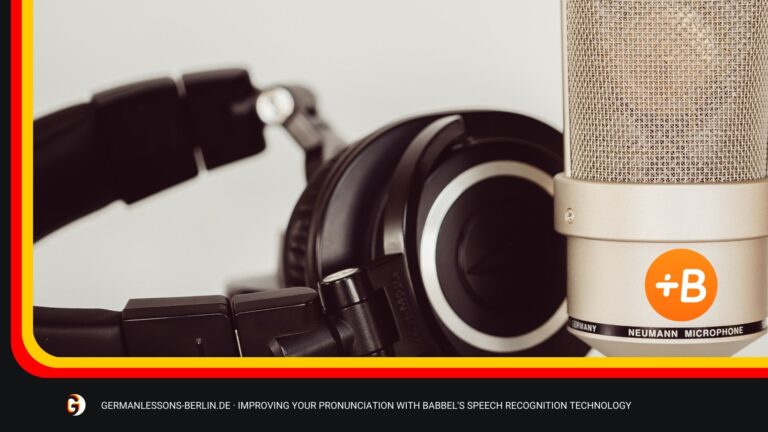Do you want to learn how to speak German like a native? Do you wish to master the language and impress your friends with your fluency? Learning how to speak German like a native can be an intimidating task, but it doesn’t have to be. With some dedication and practice, you can become a master of the German language. In this article, we’ll discuss some tips for learning how to speak German like a native.
The first step in learning how to speak German like a native is having an understanding of the basics of the language. It’s important to understand the grammatical rules, pronunciation and vocabulary before tackling more complex topics. Once you have that foundation in place, you can begin practicing your speaking skills with native speakers or study materials designed specifically for learning German.
Finally, it’s important to immerse yourself in the culture as much as possible if you’re serious about speaking German like a native. Watching movies or television shows in German, reading books or newspapers written in German and engaging with other German speakers are all great ways to practice and fully understand the nuances of the language. With these tips in mind, you can start on your journey towards becoming fluent in German!
Grammar Basics
German grammar is relatively simple, but there are some rules that need to be mastered to speak like a native. Pronouns are necessary in German, and the subject of a sentence must always be stated. Contractions are also commonly used in spoken German.
The personal pronouns in German start with “ich” for “I” and move up to the formal form of “Sie” for “you.” There are other forms like “du” for informal situations, and “es” for an impersonal pronoun. When talking about someone else, you can use the forms such as “er,” “sie,” or “es.” All these pronouns change depending on the case they are being used in. For instance, if it’s nominative case (subjective), the pronoun will be different than if it’s accusative case (objective).
In terms of contractions, they’re really important in order to sound natural when speaking German. Contractions help make conversations flow better and sound more natural when speaking. This is especially true with verbs – many verbs have contracted forms which should be used instead of their normal forms while speaking. An example would be “haben” (to have) which becomes “’n” when spoken quickly or informally – so instead of saying “Ich habe es gekauft,” you’d say “Ich ‘n’s gekauft.”
Overall, remembering these basic grammar rules will help you sound much more natural when speaking German and make conversations much smoother!
German Alphabet And Pronunciation
Now that you have a grasp on the basics of German grammar, it’s time to take a look at the German alphabet and pronunciation. With just a few simple rules, you can start to sound more like a native speaker when speaking German.
The German alphabet consists of 26 letters, just like English. However, there are some differences in pronunciation. For example, the letter ‘c’ is always pronounced as an ‘s,’ and the letter ‘z’ is always pronounced as an ‘ts.’ The umlauts (ä, ö and ü) can cause some confusion for English speakers since they make different sounds than they do in English. In German, they are each pronounced separately.
When it comes to pronunciation, many consonants are spoken with a hard sound – vowels are usually nasalised and many double consonants like ‘ch’ or ‘sch’ should be held for longer than one would think. Additionally, stress also plays a major role in spoken German pronunciation – important words such as nouns or verbs that carry meaning will usually be stressed more heavily than non-important words like articles or prepositions.
To ensure you’re sounding native-like when speaking German, focus on paying attention to how each word is said and practice saying them out loud until you feel comfortable with them. With consistent effort and practice over time, you’ll soon find yourself speaking fluent German!
Vocabulary Building
Building up your German vocabulary is essential for you to become a fluent speaker. Start with the basics and move on to more difficult words as you progress. To make the process easier, try breaking it down into small chunks and focusing on one area at a time.
Begin by learning the most commonly used words and phrases in everyday language. This includes words like ‘hallo’ (hello), ‘danke’ (thank you) and ‘auf wiedersehen’ (goodbye). You can also learn basic adjectives like ‘gut’ (good), ‘schön’ (beautiful), and ‘böse’ (bad) to describe things around you.
Once you have mastered these basic elements of the language, it’s time to focus on more complex aspects of the language such as nouns, verbs, and other parts of speech. Try learning new words from books, magazines or online resources that are available in German. If possible, try using flashcards or other visual aids to help remember certain words or phrases better. Additionally, practice saying words out loud in order to get used to their pronunciation and use them in sentences correctly.
With lots of practice and dedication, you’ll be speaking German like a native in no time!
Listening And Comprehension Skills
Listening and comprehension skills are essential for anyone wanting to learn German like a native speaker. To better understand spoken German, it’s important to practice listening to native speakers as often as possible. This could include watching films or TV shows in German, listening to podcasts, or talking with native speakers in real life.
Another helpful way of improving comprehension is by using online resources such as language-learning apps or websites that offer lessons and activities designed to help you understand the language better. These can be especially useful if you’re having difficulty understanding certain concepts. Additionally, reading books and newspapers in German can help you become more familiar with the language and its structure.
Finally, practicing speaking with other learners is a great way to get comfortable with how words are actually used in conversations between native speakers. By doing this regularly, you will be able to pick up on new expressions and terms that may not have been taught through other methods. All of these activities will help you become more confident when speaking German and eventually sound like a native speaker.
Speaking Practice
Now that you’ve gotten a good grasp on the basics of German listening and comprehension, it’s time to start building your speaking skills. To do this, focus on pronunciation and intonation, as well as learning new vocabulary and grammar. Start by familiarizing yourself with the German alphabet and phonics. This will help you better understand how words are pronounced and make it easier to sound like a native speaker.
Next, practice speaking with native speakers or through online programs like language exchange websites or online tutoring services. Speaking with others is one of the best ways to learn how to properly pronounce words and practice using correct grammar in conversation. It also exposes you to different dialects which can be helpful when travelling in Germany.
Finally, reading aloud is another great way to improve your pronunciation skills. Begin by reading short articles in German then move on to longer passages over time. Reading aloud will help you learn proper pronunciation of difficult words and phrases, as well as gain confidence in your ability to speak the language fluently.
Reading Practice
Reading is a great way to learn and practice the German language. It can help you develop an understanding of grammar and sentence structure, as well as expand your vocabulary. To get started, try reading simple books or articles in German. You can find online resources with stories written at different levels, so you can challenge yourself without becoming too frustrated. As you read more, you’ll start to recognize patterns in the language and become more comfortable with it.
To really immerse yourself in the language, try reading newspapers or magazines from Germany. This can be a great way to learn about current events and practice your comprehension skills. When you come across a word that you don’t understand, look up the definition so that you can remember it for future use. You can also keep track of unusual words or phrases that you encounter and review them periodically to test your memory.
If possible, try to find a bookclub or discussion group where people discuss books written in German. This will help you understand the text better as other people may have insights into its plot or characters that would otherwise not be obvious to you. It’s also an excellent opportunity to practice speaking and listening in German while learning from others who are native speakers of the language.
Writing In German
Transition: Now that you have a good grasp of German reading, it’s time to start writing in the language.
Writing in German is an essential part of becoming fluent and being able to communicate correctly with native speakers. To get started, focus on mastering basic grammar rules like verb conjugations, word order and sentence structure. Once you have a strong foundation, practice writing short sentences and paragraphs to get used to the rhythm of German. Once you feel comfortable with short pieces of writing, begin working your way up to longer essays or stories.
Another important part of writing in German is learning how to spell words correctly. Many people underestimate the difficulty of spelling in German because there are so many rules regarding word endings and meanings depending on context. It may be helpful to look at spelling charts or practice regularly with flashcards or online quizzes. Making note cards for all the new words you learn can also help you to remember them better when writing in German.
To improve your written communication skills, try joining an online forum where native speakers talk about different topics or read blog posts written by native Germans. This will give you an idea of how different phrases are structured in everyday conversation as well as give you exposure to more advanced vocabulary words that can be used for more complex writings such as research papers or creative stories. With regular practice and exposure, soon enough your written German will sound like it was written by a native speaker!
Familiarizing With German Idioms
Familiarizing yourself with German idioms is an important part of learning how to speak German like a native. Idioms are phrases that are unique to the language and culture, and they’re often used in informal conversations. By understanding idioms, you can pick up on conversations between native speakers and use them yourself. To get started, here are some useful German idioms to learn.
One common phrase is ‘Da liegt der Hund begraben’ which literally translates as ‘there the dog is buried’. This phrase is used to mean ‘that’s where the problem lies’ or ‘that’s the crux of the matter’. Another phrase you might hear is ‘Hast du die Katze im Sack?’ which means ‘do you have it in the bag?’. It’s used when someone has something secure and in their possession.
Another great expression to know is ‘Auf den Putz hauen’ which directly translates as ‘hitting the plaster’. This phrase is used when someone brags or shows off about something they have accomplished. You might also hear people say ‘Es geht auf und ab’ which literally means ‘it goes up and down’. This expression signifies that things aren’t going well for someone or something at that moment but could change soon.
It’s important to practice these expressions whenever possible so you can become comfortable using them in conversations with native speakers. With enough practice, your German will start sounding more natural and native-like!
Mastering German Accent And Dialects
When mastering German, it’s important to learn how to speak with the accent and dialects of a native speaker. While there are many different dialects across Germany, Austria and Switzerland, they all share certain features. To start, focus on the pronunciation of individual sounds. German has several consonant sounds that don’t exist in English and vowels that have a longer duration. Learn the correct pronunciation of words by listening to native speakers and repeating after them.
Next, pay attention to intonation patterns. When speaking German, intonation is not as important as in English; instead, emphasis is placed on grammar and word order. Listen carefully to how native speakers use pauses and stress certain words in sentences. Finally, practice using common phrases and expressions in conversation. This will help you become familiar with the language and sound more natural when you speak.
Focus on using the right grammar, pronunciation and intonation when conversing with native speakers – this will help you sound like a native yourself!
Joining A Language Exchange Program
A great way to learn the German language and work on your accent is to join a language exchange program. Language exchange programs pair up native speakers of different languages, allowing them to converse in each other’s native tongues. This is an excellent way to get some real-world practice with a native speaker. You can ask questions about German pronunciation, grammar, and vocabulary, as well as get feedback on your own speaking. Plus, you get the benefit of learning about the culture and customs from someone who lives there.
When looking for a language exchange partner, it’s important to find someone who has similar interests and goals as you do. Make sure that you both are willing to put in the effort to make the exchange beneficial for both parties. Additionally, try to join an online forum or group specifically focused on language exchanges so you can more easily find like-minded people with whom to practice your German skills.
Once you’ve found a suitable partner, schedule regular sessions where you will chat via Skype or another video messaging platform. During your conversations, talk about various topics in order to practice using different aspects of grammar and vocabulary. Don’t be afraid to make mistakes – this is part of any learning process! With consistent practice through your language exchange program will soon feel comfortable communicating in German like a native speaker!
Frequently Asked Questions
How Long Does It Typically Take To Become Fluent In German?
Becoming fluent in a language like German can be a long process. Depending on how much time you are willing to invest and your current level of knowledge, it typically takes anywhere from 3 months to several years before you can reach fluency. The amount of time it takes to become proficient in the language also varies greatly depending on your motivation, ability to focus, and access to resources.
To improve your proficiency quickly, it is important that you have an active approach to learning the language. This means making use of all available learning materials such as textbooks, audio recordings, online courses or apps, and if possible attending classes or conversing with native speakers. Additionally, practice makes perfect – by actively speaking out loud and engaging in conversations with others or even with yourself while using the new words and phrases you have learned will help you remember them better and become more comfortable with them over time.
It is also important to set realistic goals for yourself that are achievable within a certain timeframe. For example, if you are just starting out with German then begin by setting small goals such as memorizing basic vocabulary words or understanding simple grammar rules. As you progress further into the language and gain more confidence, then increase these goals accordingly so that they remain challenging but achievable at the same time.
Focusing on these areas consistently over a period of time should help develop your German language skills quickly so that eventually you can feel confident enough to speak like a native speaker!
What Type Of German Should I Learn (High German, Swiss German, Etc.)?
When learning German, it is important to determine which type of German you should learn. This will depend on the region you are in and the particular context in which you are using the language. There are three main types of German: High German, Swiss German, and Low German.
High German is the standard version of the language used in Germany and Austria as well as many other countries throughout Europe. It is also referred to as Standard German or Hochdeutsch. It is a high-level language that is quite formal and used for formal communication, such as business transactions or official government documents.
Swiss German is spoken mainly in Switzerland and parts of Liechtenstein. It has several regional dialects and can vary greatly from one area to another. It’s often considered less formal than High German but still uses a lot of similar vocabulary words and sentence structure.
Low German is spoken mainly in northern Germany and parts of Denmark, Netherlands, Poland, Russia, Ukraine, and Belarus. It is more informal than High German but still contains many elements from both High and Swiss dialects. Those who speak Low German usually use it for daily conversations with friends or family members rather than for official documents or business transactions.
No matter which type of German you choose to learn, there are some basic grammar rules that apply across all dialects to help you become proficient in the language quickly. For example, all varieties use verb conjugation with gender distinctions (ein/eine) and have consistent rules for noun declension (der/die/das). Additionally, certain phrases such as “Guten Tag!” (Good day!) are universal regardless of which dialect you choose to learn.
What Are Some Useful Online Resources For Learning German?
Learning a new language can be daunting, but there are many helpful resources available online to make the process easier. For anyone looking to learn German, there are a number of online resources that can help get them started on the right path. In this article, we’ll discuss some of these useful online resources for learning German.
One great way to start is by taking an online course. These courses are often free and offer comprehensive instruction in both grammar and vocabulary. They also typically include quizzes and tests to track your progress and keep you motivated. Many of these courses even have interactive activities so you can practice your skills in real-time with native speakers.
Another good option is to join an online discussion group or forum. Here, you can ask questions, receive feedback from native speakers, and interact with other learners who share your interests and goals. This will help you stay engaged in your studies and also provide invaluable insight into the culture and customs of Germany.
Finding tutors or language exchange partners is another great way to improve your German skills quickly. Tutors can provide personalized instruction tailored to your specific needs while language exchange partners give you the opportunity to practice speaking with someone who is already fluent in the language. Both tutors and language exchange partners are easy to find through websites like italki or Verbling.
No matter which resource you choose, it’s important to have realistic expectations when learning a new language – especially one as complex as German! Be patient with yourself and remember that mastering a new language takes time and dedication – but with the right resources at hand, it’s definitely possible!
Are There Any Good Books Or Films I Can Use To Learn German?
Learning a new language can be daunting, but with the right resources, it can also be incredibly rewarding. If you’re looking to learn German like a native, one of the best ways to do so is by reading books or watching films in German. Not only will this help you gain an understanding of the language structure, but it will also give you insight into different cultural aspects and nuances.
When selecting books or films to watch, it’s important to choose ones that are appropriate for your level of proficiency in German. For example, if you’re just starting out on your journey to learning the language, opt for books and films that are written for beginners. Alternatively, if you have a good grasp of basic grammar and vocabulary rules, then more challenging content may be ideal.
Fortunately, there are many excellent books and films available that can help you improve your conversational German-speaking skills. Popular German authors such as Erich Kästner and Joachim Meyerhoff have published works that are suitable for all levels of learners. Additionally, there is an abundance of classic movies from acclaimed directors such as Wim Wenders and Rainer Werner Fassbinder which can provide great insight into German culture and language usage.
No matter what your level of proficiency is in German, there are plenty of options out there for improving your skills through reading or viewing material in the language. So why not try picking up a book or popping some popcorn for a movie night? You never know how much progress you could make towards mastering the language!
Are There Any Special Tips Or Tricks To Help Me Remember German Words And Phrases?
When it comes to learning a new language like German, one of the most important tasks is remembering words and phrases. This can be quite challenging and time-consuming, but there are some tips and tricks that can help you remember more quickly and effectively.
One of the best ways to remember words and phrases is to practice them out loud. You can practice with a native speaker or record yourself saying the words or phrases. Repetition will help you learn more quickly because it helps to establish connections in your memory. Additionally, it’s also helpful to break down longer sentences into smaller chunks. This makes them easier for your brain to process, as well as making them easier to recall when speaking.
Creating visual aids is also a great way to learn difficult words or phrases in German. You can use flashcards or even make drawings that represent certain verbs or nouns. For example, if you’re trying to learn the word ‘jeder’ (everyone), you could draw a picture of several people together. This technique helps create an association between the visual aid and the word which makes it easier for your brain to remember it in future conversations.
Learning German doesn’t have to be difficult – by using these tips and tricks, you can make memorizing new words and phrases much easier! With consistent practice, you’ll find that over time, learning German becomes much more natural and enjoyable as well.
Conclusion
In conclusion, learning German can be a challenging but rewarding experience. With the right resources and dedication, it is possible to become fluent in German in as little as a few months. Start by deciding what type of German you want to learn – High German or Swiss German – and then begin exploring online resources such as websites, books, films, and podcasts. Additionally, practice remembering new words and phrases with mnemonic devices or by creating flashcards.
Learning a language is an ongoing process that requires practice and commitment. Set short-term goals for yourself that are achievable and review your progress regularly. Don’t get discouraged if you make mistakes; instead use them as an opportunity to learn. With consistency and patience, you’ll soon find yourself speaking German like a native!








